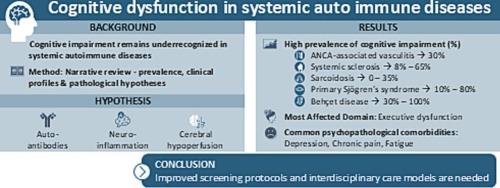系统性自身免疫性和炎症性疾病中的认知障碍:一项关于anca相关血管炎、结节病、Sjögren综合征、系统性硬化症和behaperet病的叙述性综述。
IF 8.3
1区 医学
Q1 IMMUNOLOGY
引用次数: 0
摘要
认知障碍是系统性自身免疫性疾病和炎症性疾病的一个日益被认识的特征,但除了系统性红斑狼疮之外,认知障碍仍未得到充分的诊断和研究。在这篇叙述性综述中,我们探讨了五种全身性疾病中认知功能障碍的患病率、临床概况和病理生理机制:anca相关性血管炎(AAV)、原发性Sjögren综合征(pSS)、系统性硬化症(SSc)、结节病和behet病(BD)。我们在PubMed和Embase中进行了结构化的文献检索,以确定1954年至2024年间发表的相关研究。报告的患病率差异很大:AAV为~30 %,结节病为0-35 %,pSS为10-80 %,SSc为8-65 %,BD为30-100 %。以执行功能障碍和注意缺陷为主。在一些病例中,尤其是AAV和bd患者,认知能力下降可能直接反映中枢神经系统受累,但许多患者报告的认知能力主诉没有明显的神经系统表现或影像学异常。提出的机制包括血脑屏障破坏、细胞因子驱动的神经炎症(特别是IL-6、TNF-α、IFN-γ、BAFF)、自身抗体介导的突触毒性以及与小血管病变相关的脑灌注不足。神经胶质活化和神经免疫失调是动物模型和功能成像研究中反复出现的发现。在无症状的患者中,MRI或SPECT经常观察到白质病变和脑灌注异常。合并症如抑郁、疲劳、疼痛和小纤维神经病变可加重或模仿认知功能障碍。尽管认知功能障碍很普遍,对生活质量也有影响,但很少对其进行筛查,部分原因是缺乏标准化的工具。迫切需要统一的神经认知评估方案和纵向研究,以提高对认知障碍的理解、检测和管理,并支持将其纳入常规护理。本文章由计算机程序翻译,如有差异,请以英文原文为准。

Cognitive impairment in systemic autoimmune and inflammatory diseases: A narrative review focused on ANCA-associated vasculitis, sarcoidosis, Sjögren's syndrome, systemic sclerosis, and Behçet's disease
Cognitive impairment is an increasingly recognized feature of systemic autoimmune and inflammatory diseases, yet remains underdiagnosed and insufficiently studied beyond systemic lupus erythematosus. In this narrative review, we explore the prevalence, clinical profiles, and pathophysiological mechanisms of cognitive dysfunction in five systemic diseases: ANCA-associated vasculitis (AAV), primary Sjögren's syndrome (pSS), systemic sclerosis (SSc), sarcoidosis, and Behçet's disease (BD). We conducted a structured literature search in PubMed and Embase to identify relevant studies published between 1954 and 2024. Reported prevalence varies widely: ∼30 % in AAV, 0–35 % in sarcoidosis, 10–80 % in pSS, 8–65 % in SSc, and 30–100 % in BD. Executive dysfunction and attention deficits predominate. In some cases—particularly in AAV and BD—cognitive decline may reflect direct central nervous system involvement, but many patients report cognitive complaints without overt neurological manifestations or imaging abnormalities. Proposed mechanisms include blood-brain barrier disruption, cytokine-driven neuroinflammation (notably IL-6, TNF-α, IFN-γ, BAFF), autoantibody-mediated synaptic toxicity, and cerebral hypoperfusion linked to small-vessel vasculopathy. Glial activation and neuroimmune dysregulation are recurring findings in animal models and functional imaging studies. White matter lesions and abnormal brain perfusion on MRI or SPECT are frequently observed in asymptomatic patients. Comorbid symptoms such as depression, fatigue, pain, and small fiber neuropathy may exacerbate or mimic cognitive dysfunction. Despite its prevalence and impact on quality of life, cognitive dysfunction is rarely screened, partly due to a lack of standardized tools. Harmonized neurocognitive assessment protocols and longitudinal studies are urgently needed to improve understanding, detection, and management of cognitive impairment, and support its integration into routine care.
求助全文
通过发布文献求助,成功后即可免费获取论文全文。
去求助
来源期刊

Autoimmunity reviews
医学-免疫学
CiteScore
24.70
自引率
4.40%
发文量
164
审稿时长
21 days
期刊介绍:
Autoimmunity Reviews is a publication that features up-to-date, structured reviews on various topics in the field of autoimmunity. These reviews are written by renowned experts and include demonstrative illustrations and tables. Each article will have a clear "take-home" message for readers.
The selection of articles is primarily done by the Editors-in-Chief, based on recommendations from the international Editorial Board. The topics covered in the articles span all areas of autoimmunology, aiming to bridge the gap between basic and clinical sciences.
In terms of content, the contributions in basic sciences delve into the pathophysiology and mechanisms of autoimmune disorders, as well as genomics and proteomics. On the other hand, clinical contributions focus on diseases related to autoimmunity, novel therapies, and clinical associations.
Autoimmunity Reviews is internationally recognized, and its articles are indexed and abstracted in prestigious databases such as PubMed/Medline, Science Citation Index Expanded, Biosciences Information Services, and Chemical Abstracts.
 求助内容:
求助内容: 应助结果提醒方式:
应助结果提醒方式:


